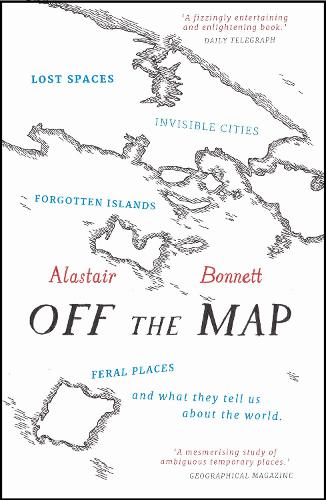
Off the Map: Lost Spaces, Invisible Cities, Forgotten Islands, Feral Places and What They Tell Us About the World
(Paperback)
Publishing Details
Off the Map: Lost Spaces, Invisible Cities, Forgotten Islands, Feral Places and What They Tell Us About the World
By (Author) Alastair Bonnett
Quarto Publishing PLC
Aurum
22nd April 2015
2nd April 2015
United Kingdom
Classifications
General
Non Fiction
Travel writing
Settlement, urban and rural geography
304.2
Physical Properties
Paperback
320
Width 129mm, Height 198mm
Description
From forgotten enclaves to floating islands, from hidden villages to New York gutter spaces, Off the Map charts the hidden corners of our planet. And while these are not necessarily places you would choose to visit on holiday - Hobyo, the pirate capital of Somalia, or Zheleznogorsk, a secret military town in Russia - they each carry a story about the strangeness of place and our need for a geography that understands our hunger for the fantastic and the unexpected. But it also shows us that topophilia, the love of place, is a fundamental part of what it is to be human. Whether you are an urban explorer or an armchair traveller, Off the Map will inspire and enchant. You'll never look at a map in quite the same way again.
Reviews
'Anabsorbing book packed with remarkable facts a joy to read
Alastair Bonnetts high-speed world tour of places and non-places whose stories would bring the most somnolent class to life. Bonnett zooms effortlessly around far-off spots sometimes in person, more often via the internet but he does not ignore those closer to home. Fizzingly entertaining and enlightening book.
"Bonnett dares us to rethink exploration in a world that has been fully charted, taking us from micronation Sealand - a forsaken sea fort claimed by a Brit as his own sovereign nation - to Arne, a Second World War decoy city that saved thousands of lives. Forty-seven fascinating essays prove why "our topophilia can never be extinguished or sated" and how these locations over insights into our history and society."
"A fascinating delve into uncharted, forgotten and lost places. But it s not just a trivia-tastic anthology of remote destinations but a nifty piece of psycho-geography, explaining our human need for these cartographical conundrums."
"Bonnett dares us to rethink exploration in a world that has been fully charted, taking us from micronation Sealand - a forsaken sea fort claimed by a Brit as his own sovereign nation - to Arne, a Second World War decoy city that saved thousands of lives. Forty-seven fascinating essays prove why "our topophilia can never be extinguished or sated" and how these locations over insights into our history and society."
Alastair Bonnett s high-speed world tour of places and non-places whose stories would bring the most somnolent class to life. Bonnett zooms effortlessly around far-off spots sometimes in person, more often via the internet but he does not ignore those closer to home. Fizzingly entertaining and enlightening book.
Fearlessly explores the dark side of humanity while constantly challenging our conceptions of place, borders and boundaries, and how we as humans use locations and geography to define ourselves and the world around us. Importantly, Bonnett s careful research and fascinating theories are complemented with passages of wonderfully written prose. A thought provoking triumph.
A mesmerising study of ambiguous temporary places.
'An absorbing book packed with remarkable facts a joy to read
Author Bio
Alastair Bonnett is Professor of Social Geography at Newcastle University. Previous books include What is Geography and How to Argue. He has also contributed to history and current affairs magazines on a wide variety of topics, such as world population and radical nostalgia. Alastair was editor of the avant-garde, psychogeographical, magazine Transgressions: A Journal of Urban Exploration between 1994-2000. He was also involved for many years in situationist and anarchist politics. His latest research projects are about memories of the city and themes of loss and yearning in modern politics.
